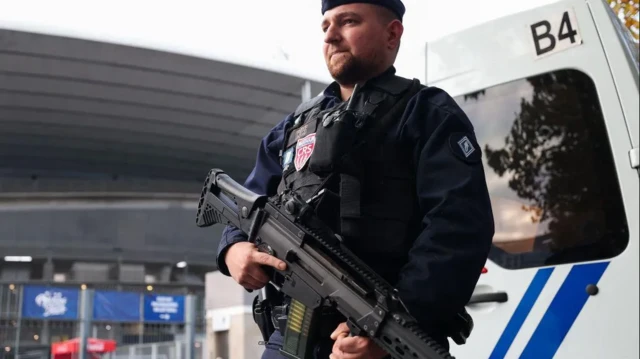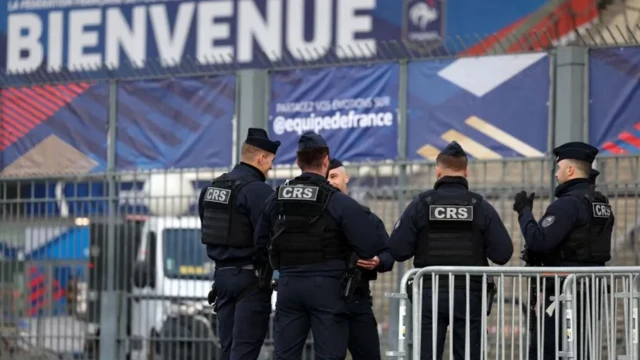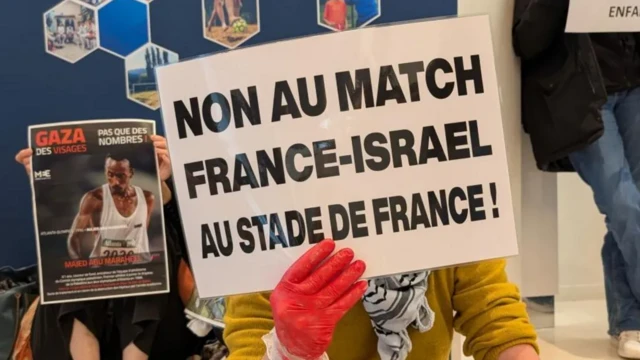
image source, AFP
- Author, Hugh Scofield
- Role, BBC News – Paris
On Thursday, the French capital, Paris, witnessed the deployment of thousands of police officers to secure a football match between the French and Israeli teams in the European Nations League.
This comes after a week of violence in the Dutch capital, Amsterdam, where fans of the Israeli team Maccabi Tel Aviv were beaten in the streets.
The police chief in Paris, Laurent Nunez, says that four thousand police officers will be used, 2,500 of them to secure the “Stade de France” in the suburb of Saint-Denis, north of Paris, while 1,500 will work to secure public transportation and the French capital.
In addition, approximately 1,600 private security personnel will be used inside the Stade de France.
Also, a French special forces unit will undertake the task of guarding the Israeli team that is visiting Paris.
Laurent Nunez described the match as “high-risk, given the mineable geopolitical context in which it is being held.”
“We will not allow any attempt to disrupt public order,” Nunez said.
The Stade de France, which will host the match, can accommodate about 80,000 spectators, however, only a quarter of this number will attend.
Following advice from the Israeli government, no more than a hundred or so Israeli fans will attend, according to expectations.
Politicians in Europe, in turn, denounced the “resurgence of anti-Semitism”, following scenes of Israeli fans being beaten in the streets of the Dutch capital, Amsterdam, after the Ajax-Maccabi match.
However, fans of the Israeli team Maccabi were involved in riots and vandalism; They tore up Palestinian flags, attacked a taxi, and chanted anti-Arab slogans, according to official authorities in the city of Amsterdam.
The Dutch authorities added – in a 12-page report – that these Israeli fans were targeted by “small groups of troublemakers…who were on foot or in small cars or motorcycles.”
It is possible that violence between Israel and its neighbors in the Middle East will spread to Europe.
It should be noted that France, Belgium, and the Netherlands each have a large Muslim population of North African origins. This large number of Muslims in Europe live side by side with a much smaller Jewish population that supports Israel in the same country.
In a gesture expressing solidarity with European Jews after the beating incidents in the streets of Amsterdam, French President Emmanuel Macron announced that he will attend Thursday’s match between his country and its Israeli guest, which will start at 19:45 GMT (20:45 French local time).
Macron is not the only one who will attend the match; He will also be accompanied by Prime Minister Michel Barnier, as well as former French presidents François Hollande and Nicolas Sarkozy.

image source, AFP
Fans, in turn, were told that they may be asked to show their ID cards before the match. Bars and restaurants in the area were also told to close after midday on Thursday.
The Stade de France previously witnessed a serious violation of the system in a match between Liverpool and Real Madrid in the Champions League final in 2022. But after that, the stadium hosted matches in the Rugby World Cup, as well as hosting the Paris Olympics, all of which passed safely.
The “France Proud” party on the far left, which supports the Palestinians and Lebanese in their struggle against the Israelis, called for Thursday’s match to be canceled, or at least for President Macron to refuse to attend the match.
Representative David Guerro said: “We do not want our head of state to honor a country that commits genocide.” Israel, for its part, denies committing genocide and says these allegations are baseless.
But French Interior Minister Bruno Rotayo saw that there was no room for canceling the match or changing its venue, saying: “France will not yield to inciters of hatred.”
France and Israel were in the same group in the European Nations League, along with Italy and Belgium. In the first leg, which was held in Budapest, France defeated Israel by four goals to one.
On Wednesday evening, on the eve of the match, signs of tension occurred in Paris, as the authorities in the French capital agreed to hold a pro-Israel celebration. It was expected that this celebration would witness the presence of the extreme right-wing Israeli minister, Bezalel Smotrich, while it later became clear that his attendance would be limited to a technical conference. Video conferencing.

image source, AFP
In protest against the holding of the pro-Israel celebration, several thousand pro-Palestinian and anti-racist supporters demonstrated in Paris, and confrontations broke out before police forces used tear gas canisters to disperse the demonstrators who targeted a McDonald’s restaurant in the Montmartre neighborhood.
It is noteworthy that relations between Macron and Benjamin Netanyahu have been marred by severe tension in recent weeks, especially after Macron accused the Israeli Prime Minister of “spreading barbaric barbarism” in Gaza and Lebanon.
French Jews were also angry at statements attributed to Macron that Netanyahu must accept United Nations calls for a ceasefire because “Israel itself was founded by a United Nations decision,” while in Israel it was considered an insult to the Jews who gave their lives for the establishment of their state.
On the other hand, there was anger in France when the Israeli authorities detained two French officials at a religious site in East Jerusalem that is under French administration.
In conclusion, it should be noted that French President Macron’s position on Middle East issues is described as wavering, similar to his position on issues in many other regions around the world. It fluctuates between declared support for Israel at times and support for its Arab neighbors at other times.
ظهرت في الأصل على www.bbc.com
